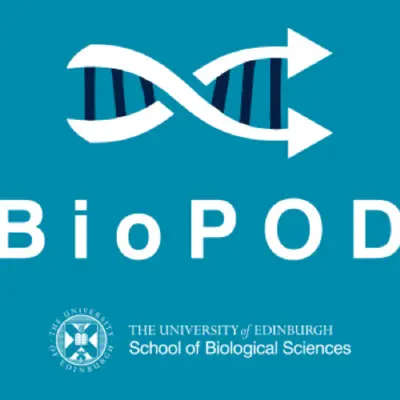
BioPOD
63 episodes Last Updated: Jun 18, 25
Explore the edges of known biology and meet the people - a podcast direct from the PhD students at the heart of university research. BioPOD is the official podcast from the School of Biological Sciences at the University of Edinburgh.
Episodes
Jun 18, 2025
Cell clocks: the circadian rhythm of the cells
From jet lag to gene expression, your body runs on a schedule — but how? In this episode, Nitara chats with Dr. Priya Crosby about how individual cells keep time, what happens when those clocks fall out of sync, and why understanding circadian rhythms is key to decoding health and disease.Interview and editing by Nitara, art and production by Evangelia
In today’s episode, Nitara chats with Dr. Ornella Bertrand about the evolution of the mammalian brain and inner ear, and how fossil evidence helps piece together this deep evolutionary history. Please respond to our survey so we can find out more about you and what you want to listen to! https://docs.google.com/forms/d/e/1FAIpQLScqoV4JoROJCfcMtvk4-Wer0uJGpvQfzUj3M4Mz8vx_9ScjKA/viewform?usp=header
Apr 29, 2025
Science and Policy with Prof. Andrew Millar
Ever wondered about the intersection of policy and science? Tune in as Markella chats with Professor Andrew Millar about his career and work as the Chief Scientific Advisor on the environment, natural resources, and agriculture for the Scottish Government. Interview and editing by Markella, art by Keiran, and production by Manushri.
Mar 27, 2025
Becoming your own scientist
Ever wondered what it’s really like to become an independent researcher—calling the shots on what to study and navigating the highs and lows of doing science on your own terms? In this episode, Matthew Swaffer chats with Liz about starting his own lab, diving into all things cell-size related, and what the transition to leading your own research really feels like.Please fill out our survey so we can hear from you about where to take BioPOD in the future! SURVEY LINK: https://docs.google.com/forms/d/e/1FAIpQLScqoV4JoROJCfcMtvk4-Wer0uJGpvQfzUj3M4Mz8vx_9ScjKA/viewform
In this episode of Biopod's entrepreneurship series, Keshav and Nitara sit down with Dr. Riam Kanso to discuss the journey behind ConceptionX, a deep-tech venture programme to help PhD students fund their entrepreneurial pursuits. Please respond to our survey so we can find out more about you and what you want to listen to! https://docs.google.com/forms/d/e/1FAIpQLScqoV4JoROJCfcMtvk4-Wer0uJGpvQfzUj3M4Mz8vx_9ScjKA/viewform?usp=header
Jan 22, 2025
Conservation genetics with Dr Alex Ball
Every person interested in biology knows that population diversity is important for ecosystems. But do we understand what diversity means? In this episode Markella interviews Dr. Alex Ball from The Royal Zoological Society of Scotland about his work on conservation genetics, which is one of the pillars of conservation biology. He goes in depth about different species conservation in Scotland and elswhere around the world. Interview by Markella. Editing by Manushri and Markella. Artwork by Anna. Produced by Severina
Nov 30, 2024
Unstable fungal resistance
In a world where the human population is predicted to reach 10 billion by 2050, we urgently need to find ways to increase crop production. However, it is made more difficult by some species of crop-pathogenic fungi, which can decimate crop yields, and also develop mutations that make them resistant to antifungal compounds. Dr Robin Allshire's group is trying to understand a not-so-well-known form of this resistance which could help farmers and governments tackle the current global food production challenge.Recorded & produced by Anna Motýľová.Edited by Haomiao Cheng.Cover art by Manushri.Follow us:X: @BioPodEdinburghLinkedIn: BioPOD PodcastInstagram: @biopodedinburgh
Oct 29, 2024
Combining Art & Science: How and Why
Video version: https://youtu.be/weaFSVsvyBY Anna Motýľová talks with Dr Keira Tucker, manager of ASCUS Art & Science, the first open access lab space in Scotland. They host science workshops for the general public and art exhibitions inspired by science. You will learn about Keira's personal journey as an artist/scientist, as well as 3 weird and wonderful creative projects she has facilitated between artists and scientists from the University of Edinburgh.By the end of this episode, you will have thought about things you never have before. What happens to cancerous organs once they leave the body? Should noise in scientific data always be discarded? When medical practicioners don't hear the voices of suffering patients, can an artistic approach help?Interview recorded, edited and produced for BioPOD by Anna Motýľová.Camera by Ainslie Rönsdorf.Intro and outro recorded by Felix Selasi Dewornu.Episode cover art by Amandine Hong-Minh.Check out the featured artists:ASCUS Art & Science [www.ascus.org.uk]G-lands by Emily Fong [https://emilyfongstudio.squarespace.com/]Fluorescent images & video of salivary glands by Dr Elaine Emmerson and Dr Sara Knox, Centre for Regenerative Medicine [https://regenerative-medicine.ed.ac.uk/research/elaine-emmerson]Oculations by Victoria Evans [www.victoriaevans.space]Blackford Eye video by Dr Richard Essery [https://www.research.ed.ac.uk/en/persons/richard-essery/]Hemispherical Mosquito by Dr Cecile Menard [https://www.research.ed.ac.uk/en/persons/cecile-menard]Chapters:01:26 What is ASCUS Art & Science?03:46 Keira's background05:14 ASCUS as a lab space06:39 Keira's artistic journey08:55 Keira's work in ASCUS09:56 Project 1: The Egyptian god in salivary glands11:27 Why salivary glands?14:22 Why bring artists into scientific teams?18:24 The artwork: From drawings to cabbages29:29 The workshops: Scientist-artist-sufferer discussion33:46 Project 2: Noise in snow science39:04 Scientific vs. artistic research40:30 Changing mindsets41:59 Project 3: Surface echoes47:05 The eczema experience(s)49:04 Communicating science through performance53:07 Training GPs through art54:15 Future projects56:11 Final lessons
In this episode of BioPod’s entrepreneurship series, Keshav talks with Dr. Alex Speakman about his entrepreneurial journey of starting E.V.A Biosystems. Alex talks about the help and resources available to aspiring entrepreneurs to turn their ideas into successful startups. He also provides helpful information on navigating through the various stages of a startup including ideation, validation and patenting. Interviewed by Keshav, edited by Evangelia, art by Amandine and produced by Keshav.
Aging, or senescence has been a topic of scientific fascination for a long time. Natural populations like the Soay Sheep in St Kilda, a remote scottish island, are ideal to study aging theories in the wild.In this summer episode, Professor Dan Nussey speaks to us about the long running Soay Sheep project and the insights they provide on the study of senescence. Interview by Markella Moraitou. Edited by Flora Caldwell, Art by Severina Marija Pociunaite, Produced by Nitara Wijayatilake.